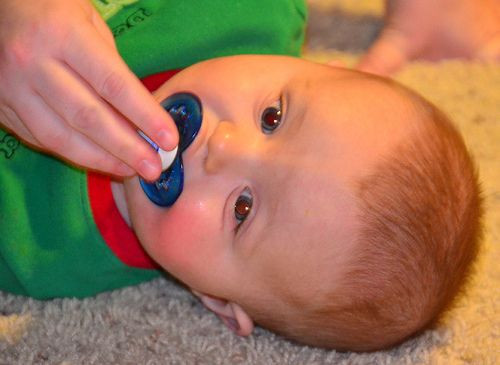Pacifiers May Stunt Emotional Maturity in Boys

Pacifiers have long been a Godsend for tired parents and for airplane passengers, but their use has not been without controversy. Already, the World Health Organization and the American Academy of Pediatrics call for pacifiers' use to be limited because of their connection to ear infections and dental abnormalities. Now, a new study published in the journal Basic and Applied Psychology has found that heavy use of pacifiers can cause children's emotional maturity to be stunted during childhood and adulthood.
The study, from the University of Wisconsin, Madison and the French National Agency of Research, was made up of two separate tests. The first test rounded up a group of six- and seven-year-old boys and showed them a video. The boys who had spent more time with pacifiers during infancy were less likely to mimic the faces shown to them on the video, than those who had been less reliant on pacifiers.
The second test asked college students to take an exam meant to assess their level of emotional intelligence. For young men who'd been more reliant on pacifiers as babies, this fact was either reported by the test-takers themselves or by their parents, their emotional intelligence was scored lower than their peers who had used pacifiers less often.
Researchers believe that babies are less able to imitate the faces of people around them if they have a pacifier in their mouth.
Interestingly though, that correlation did not exist for women or girls, who received high marks on their emotional intelligence regardless of the amount that pacifiers had been used with them. Researchers have a few theories about this difference. They believe that girls develop earlier than boys, that girls' emotional development either occurs before or despite pacifier use, that boys are more vulnerable than girls, or that parents overcompensate with their daughters to make sure that their emotional growth still occurs despite pacifier use.
"It could be that parents are inadvertently compensating for girls using the pacifier, because they want their girls to be emotionally sophisticated. Because that's a girly thing," Paula Niedenthal, a study author, says. "Since girls are not expected to be unemotional, they're stimulated in other ways. But because boys are desired to be unemotional, when you plug them up with a pacifier, you don't do anything to compensate and help them learn about emotions."
But researchers are careful to note that more research needs to be done on the matter in order to determine how much pacifier use harms emotional maturity and when. They say that nighttime pacifier use does not seem to be a problem because babies are not observing faces during that period anyway.
Published by Medicaldaily.com



























